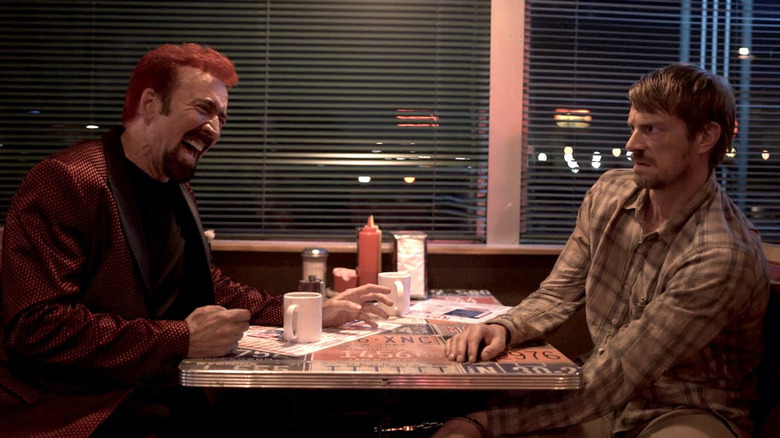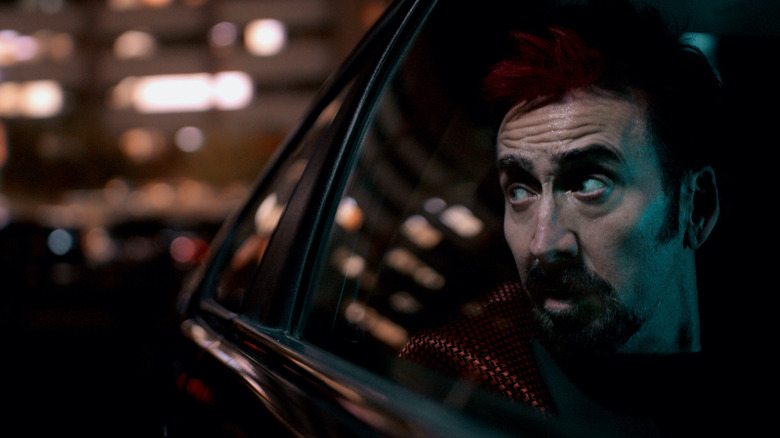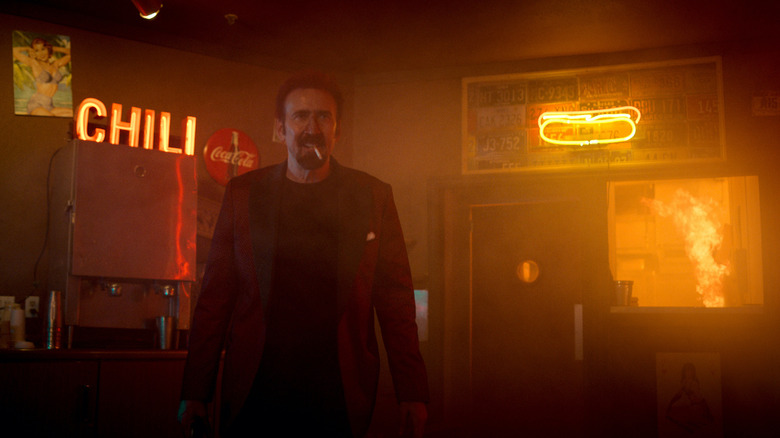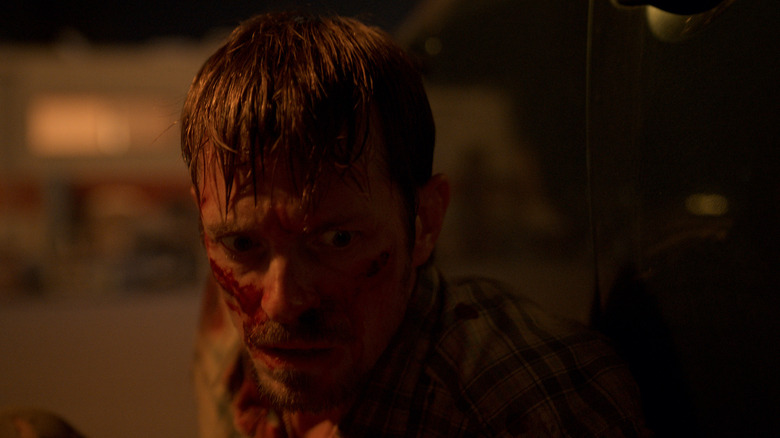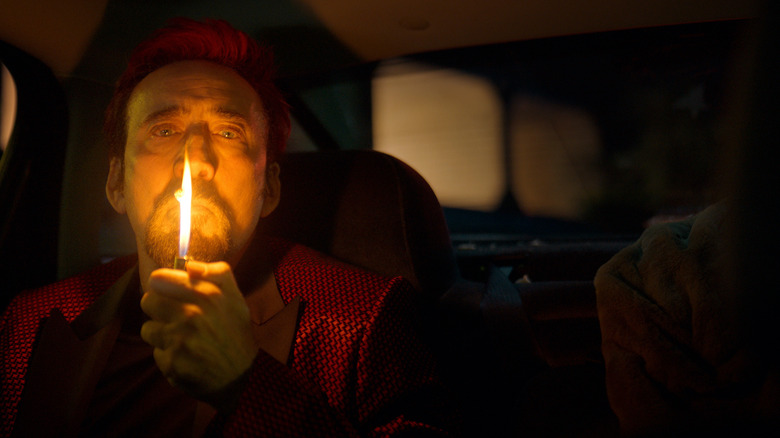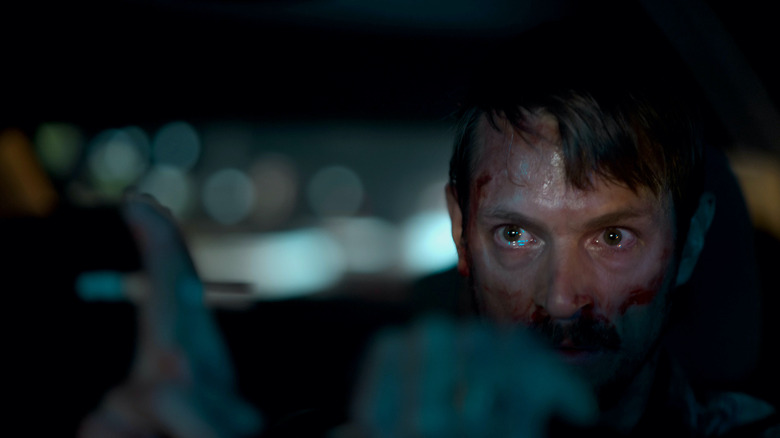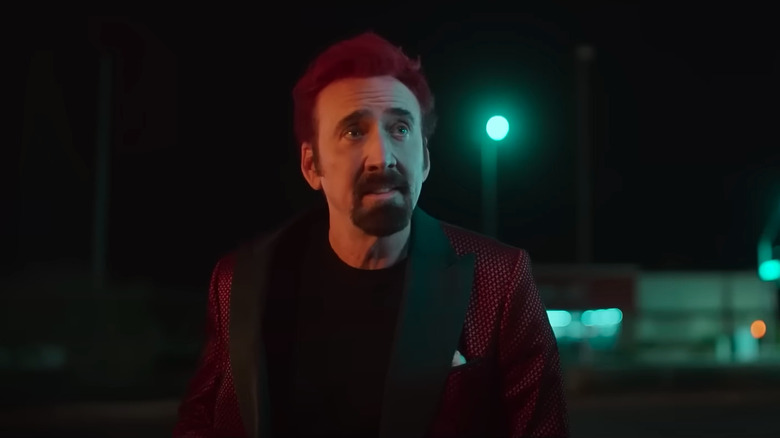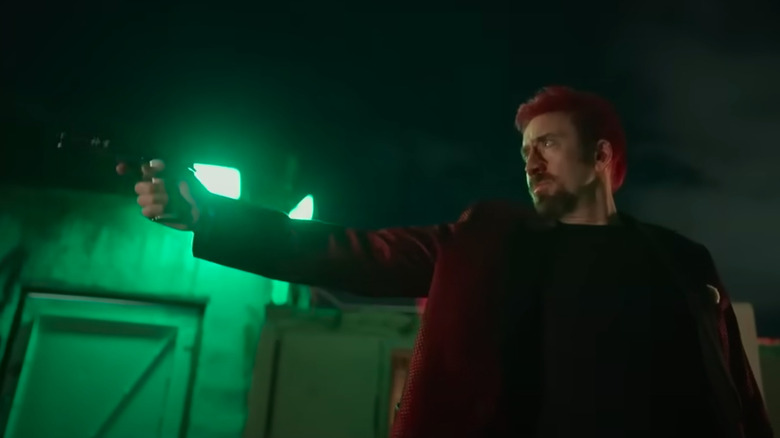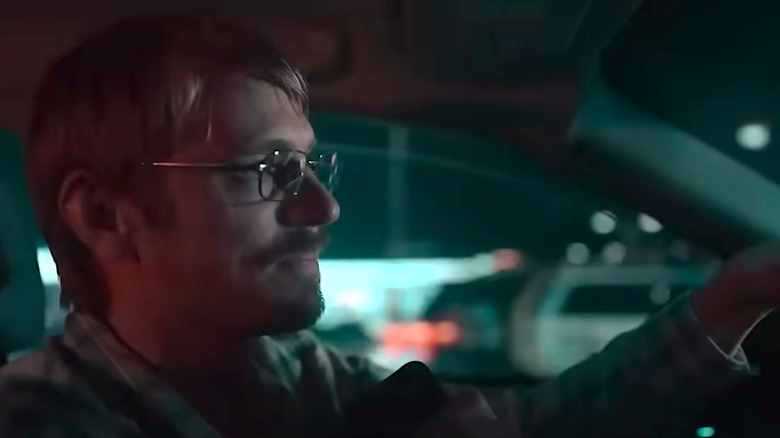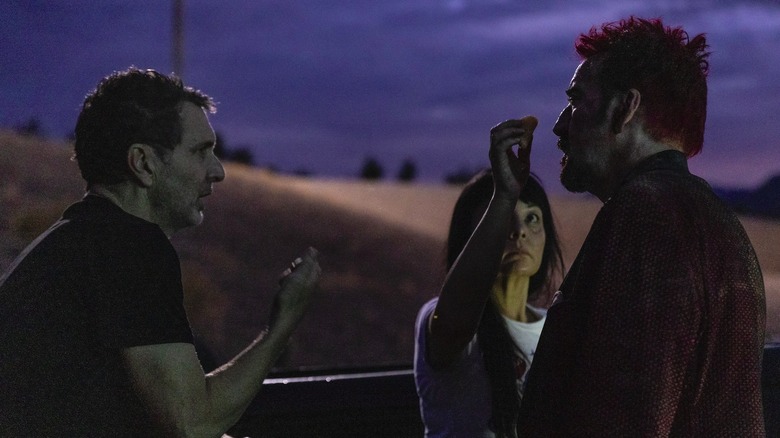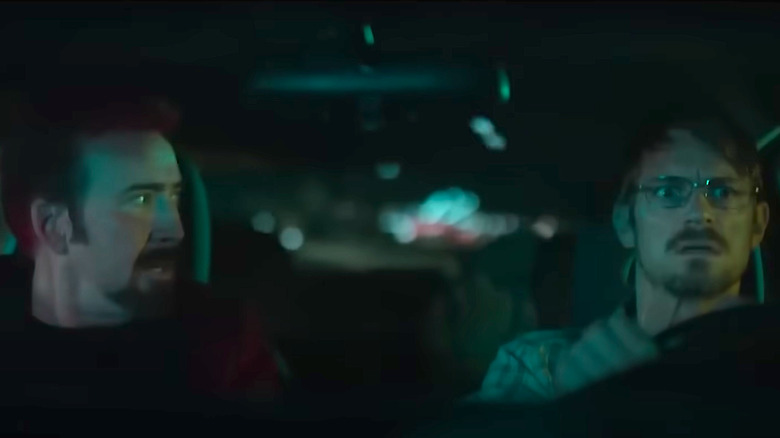The Ending Of Sympathy For The Devil Explained
Contains spoilers for "Sympathy for the Devil"
In director Yuval Adler's film, "Sympathy for the Devil," the title asks you to have compassion for someone we don't normally extend compassion to. But who is the Devil and why should we have sympathy for him? This is just one of the questions embedded in the new movie starring Nicolas Cage as the Passenger and Joel Kinnaman as the driver he picks up at gunpoint. But there's much more to their stories than would appear at first glance.
In fact, while Kinnaman's David Chamberlain may look like a mild-mannered grade-school teacher, in reality, there's a lot going on beneath the surface. His wife is currently in labor with their third baby, and they're hoping that this one will live like their middle child, not die like their first. Also, David may be very different than his conservative exterior suggests ... and it's only a matter of time before his alter-ego comes out. Meanwhile, Cage's Passenger looks like a sideshow character, with his Kool-Aid-red hair, devil-like goatee, and shiny scarlet blazer — but he knows a whole lot more about David than he's letting on, and he's going after him for a very specific reason.
Together, the pair take a stunning trip across Las Vegas, but with many revelations coming fast and furious throughout the film, there are some that may have been missed. Here is the ending of "Sympathy for the Devil" explained.
What to remember about the plot of Sympathy for the Devil
"Sympathy for the Devil" begins with David talking to his second-born son, his first child to live, as he drives to the boy's grandmother's house. David drops his son off and heads to the hospital where his wife is currently in labor with their third baby. But when he pulls into the hospital, the Passenger gets in his car. David tells him he's not an Uber, but the Passenger brandishes a gun and tells him to drive. The Passenger tells David that he knows who he really is, but David claims he doesn't know what the Passenger is talking about. Meanwhile, the Passenger says David's driving him to deliver last rites to his mom in a hospital and then that he's meeting a guy at a private airfield in Boulder, Colorado. Neither is true.
To prove how unhinged he is, the Passenger goads a cop who pulls them over and then kills him in cold blood. David refuses to drive after this incident but quickly realizes he doesn't have much of a choice if he wants to stay alive. It isn't until David and the Passenger are sitting in a diner and the Passenger terrorizes a mother with a little girl that David finally admits that he really is the individual the Passenger is looking for. David's real name is James Levine and 15 years ago he was an infamous hitman for the mob in Boston.
The Passenger's revelation
While David has admitted who he really is, the Passenger has yet to do so. Instead, he goes about killing just about everyone in the sparsely populated diner. While the mother and daughter escape, the truck driver and chef die by the Passenger's hand. Interestingly, though, he lets the waitress live. All of this gives David just enough time to escape from the handcuffs that the Passenger had chained him to their booth with.
David runs into the parking lot, and the Passenger, knowing David is hiding somewhere nearby, tells his story. He was an accountant for the mob who worked for a man named Jacob Sullivan. At one point he started doing the books for one of Sullivan's associates, who was taking some of the money for himself. When Sullivan found out, he had the accountant invite the associate to his house. The accountant sent his wife and daughter away during this interlude, but the wife came back home just as Sullivan's hitmen shot the associate.
The accountant's wife was traumatized by what she saw. She started taking pills and drinking, and eventually told whoever would listen about the murder — so James Levine called the accountant and told him his wife had become a problem. At that point, the accountant (our Passenger) decided to run with his wife and daughter but stopped to get supplies first. By the time he got back, his wife and daughter were dead and his house was on fire.
What happened at the end of Sympathy for the Devil?
After the Passenger tells his story, David comes out of hiding, and given the isolated nature of the diner and the Passenger's gun, decides to continue to drive them both. During the drive, he tells the Passenger that when he entered his house 15 years ago and his wife saw his gun, she attacked him. He shot her three times to get her off him, but in the process, he accidentally shot the Passenger's daughter. He felt awful about this, and quit the Boston mob that night, but believed he paid his dues when his own daughter died. The Passenger, however, still wants revenge.
So, as a group of police cars are following them, David wrecks the car. He is now fully James Levine, as he shoots the first police officers who make it to him with the Passenger's gun. Then after a short exchange, he proceeds to choke the Passenger, who's been badly hurt in the crash, until he's dead. More police sirens sound as James puts the gun in the Passenger's lifeless hand. James sinks down to the ground, telling himself, "I'm David." By the time the cops reach him, he IS David again.
What David and the Passenger's final battle means
For most of "Sympathy for the Devil," David looks like he's outmatched and outgunned. After all, the Passenger may be a bit wacky, but he is willing to use that gun with deadly intent. In the end, though, David reverts back to James, the mob hitman, and takes out the Passenger — as well as the cops who could tell others that he isn't who he says he is. David may look like a mild family man now but he still has James buried inside, and when he comes out everyone around him should watch out because James gets what he wants.
The final battle shows that David-slash-James is not to be messed with, by the Passenger or anyone else. While he doesn't use it most of the time, David still has that killer instinct buried inside him, and he can take out the best of them, no matter who they are or what their past is.
So in the end, David, not the Passenger, is victorious in their battle. He takes out the Passenger with extreme prejudice and seemingly very little remorse. A surprise outcome for the audience and perhaps for the Passenger, but not for David.
Does David get away with it?
Though we don't see what happens after the police come at the end of the film, all signs point to David not only getting away with it, but him looking like the everyman hero for surviving. He may have killed the Passenger, and worse, police officers, but he's set things up so he doesn't look guilty. He used the Passenger's gun to kill those police officers and placed the gun back in the Passenger's hand so it looks like he killed them. And he can chalk the Passenger's death up to wounds he sustained from the car crash.
Besides, even if there are some irregularities with the Passenger's wounds, who would blame David if he did kill him? From everything other people can discern, including the waitress at the diner, David was the victim of the Passenger's sick game. If he eventually fought back, either by crashing the car or with brute strength afterward, he'd be cheered for standing up for himself. So although David let James out, he did so at a strategic moment when he was sure he could get away with what he was planning, and all signs point to his being right about that.
Why the Passenger waits so long to take his revenge
The Passenger's reasons for wanting to kill David, once we learn them, are understandable. After all, David-slash-James killed the Passenger's wife and daughter 15 years ago and got away scot-free. What doesn't make sense is why it took the Passenger so long to seek James out. One possibility is that it simply took the Passenger that long to find him. All indications point to James leaving Boston without a trace the night he killed the Passenger's loved ones. Since he moved to Las Vegas and changed his name, it could have taken the Passenger a while to find and identify him.
Another possibility is that the Passenger wanted James to be happily married with kids so he could have an idea of what it would be like to lose them. After all, James didn't have any attachments when he murdered the Passenger's family, but as David, he has his wife, child, and new baby to lose.
Then there's the possibility that the Passenger's cancer triggered the whole escapade. Towards the end of the film, David guesses correctly that the Passenger has lung cancer that he won't recover from. Perhaps the Passenger, knowing how brutal David-slash-James can be, waited until he had nothing to lose, including his life, to try to take his revenge, knowing that if he didn't succeed he wouldn't die much earlier than he would have otherwise.
Why the Passenger doesn't kill David right away
The Passenger has numerous opportunities to kill David during their car ride, but he doesn't take them because he wants to explain why he's doing what he's doing. Of course, it takes a long time for the Passenger to reveal the truth and he tells several lies in between, so why not just tell the truth right away and get on with it? It appears the Passenger also wants David to admit that he's James Levine. Only then will the Passenger reveal the whole story of his past.
In addition to the raw details of the story of the accountant, aka the Passenger, and his wife and child, he reveals that the rabbits his daughter raised were screaming as his house in Boston burned, a detail no one could accuse him of making up. It seems that at this moment, the Passenger just wants to unload on David — more, perhaps, than he wants to kill him. If he wanted to simply kill David, he would have right after he admitted who he was and the Passenger revealed his story. Instead, he has David get back in the car and continue driving so the Passenger can share more details. It's his fatal flaw, and it lets James take control of the situation.
Does David's wife know the truth?
David's wife Maggie isn't seen during the film, but she's heard at several points as a disembodied voice on the phone. She calls when David doesn't come to her room in the hospital, and a few more times to see what's going on. She never seems worried, though, even when David is somewhat late and, later, very, very late. This could be because she's focused on having a baby and has taken medication to make the process easier. After all, her first pregnancy resulted in the baby dying, so she's preoccupied with making sure everything goes well at the hospital.
It could be something more, though. After all, most women who are abandoned by their husbands at the hospital while they're having a baby aren't going to be too happy. Maggie, on the other hand, seems a little nervous, but otherwise fine, especially after she hears the Passenger's voice on the other end of the line. While we don't hear their conversation, we can assume the Passenger spells out the situation that her husband is in, and yet she isn't worried about him the way one would expect. Instead, she seems to take for granted that he's fine, as one would if they knew their husband used to be ... a hitman for the mob. Perhaps Maggie knows more than she lets on about her husband's past.
What the director and critics have said about the ending
While there are no comments from the stars of "Sympathy for the Devil" because of the strikes, in a brief interview, the director Yuval Adler said of Kinnaman's performance at the end of the film, "You have the change that he needs to have as a character, which is remarkable because it sells you one thing and then flips it on you, so I like that aspect." If only the critics agreed with him. The critics who liked the film did so because of Cage's bravado performance. Those who didn't saw it as more of the same from the star: over-the-top showboating. One thing almost everyone agreed on, however, was that the production didn't quite pull off the ending.
For example, The A.V. Club's Luke Y. Thompson enjoyed the movie, particularly Cage's performance, except for the ending, which he said: "involve[s] some complicated backstory that's hard to focus on or clarify." The Hollywood Reporter's Jordan Mintzer, who similarly gave the movie a decent review, claimed the final twist is "not totally convincing," but still enjoyed Cage's antics.
Meanwhile, the Observer's Casey Epstein-Gross, who didn't care for the film, said, "The entertaining surrealism that energized the opening movements fizzles out as the film reaches the third act, the reveals of which are both mundane and expected." Ultimately, however you feel about the film, most people aren't wild about the third act, particularly not the part where the Passenger reveals his true backstory.
Who's the Devil and who should we have sympathy for?
For most of the film, we're led to believe that the Passenger is the Devil. The trouble is we don't feel all that much sympathy for him, so it's hard not to wonder what exactly the title is talking about. Then, when the third act rolls around and we hear his backstory, we start to feel at least some compassion for him. This seems to be our answer, but to some degree, once we get to know who he is, "Devil" could describe Kinnaman's David, too.
We feel sympathy for David from the beginning of the story, and even when his true identity is revealed, we can't help but continue to feel bad for him. After all, he has a baby on the way, and even if he used to be a killer for the mob, he isn't anymore. While the Passenger, as played by Cage, gets all the attention and the love or the hate that comes with it, his performance is so extreme that it's more challenging to care about his traumatic past.
David, on the other hand, gets our sympathy from the beginning, so even when he kills police officers at the end of the movie, the compassion for his character doesn't completely abate. It's an irony of the title that there are two potential devils in the mix and only one gets most of our sympathy.
